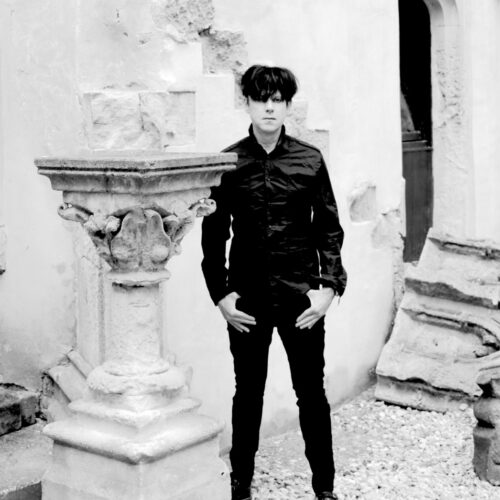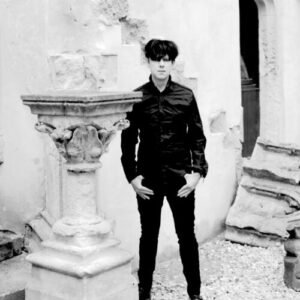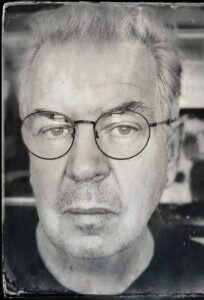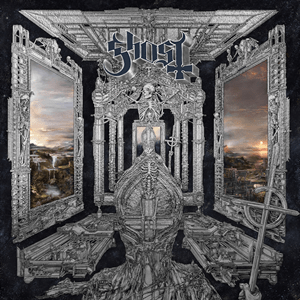Leading band of the prestigious English label 4AD by Ivo Watts-Russell in the 80s – together with Cocteau Twins and Dead Can Dance – the Dutch Clan Of Xymox have been one of the icons of the european darkwave for over three decades. With a large following that over time has made their first albums, above all, real milestones of this genre. There is no dark party, in fact, in which at least a couple of their most famous songs may be missing. The unmistakable voice of Ronny Moorings – founding leader and today the only original member still active – is the most important trademark of the band, for sure; a voice that has been imitated by countless other frontmen without ever being equaled. And it’s with Ronny that, in these days, I have revisited the traces of his long career in a nice conversation, summarising the salient points in this interview.
Deca – Hello Ronny! It’s a pleasure talking with you about Xymox and music in general. How’s it going your new tour? I know how difficult has been for all we musicians to manage concerts and tours in these last months.
Ronny – We have been doing more than a few shows already. This year we have done twelve shows and now I am on my way to the next. We played in many different countries with all their own Covid policies, some none, some more restricted like in Germany. All in all it felt excellent and so far all went swimmingly. Sean contracted Covid in the Ukraine (noticed luckily only when he came home) and had to stay home for two weeks. Daniel had it last year in October 2020 and recovered after a week. We are aware of the dangers but we are aware that all sorts of viruses go about. You can’t stop living your life because of this.
Deca – Let’s go back in time. When you began to play on the stage you were so young. Clan Of Xymox debut was in the early ’80s and you were twenty-year-old, more or less. How has the way to manage a live show changed, considering those years and present days?
Ronny – Yes, as a child I was already very active with music I was in a band at a very early age. Played live with local bands, I DJ-Ed in local clubs and as a student I also had my WHS radio program in Amsterdam every week one Wednesday night. I never stopped making music. The way we do shows hasn’t changed that much. Technology changes and we make use of that. When we were on a major label we used to work with more persons on the road. Such big productions are now obsolete and we are a nice lean outfit which makes things much easier to go to and organize.
Deca – Clan Of Xymox – as I said – were a very young band. Your debut album had been published in 1985 by 4AD label. I think: so young and immediately able to find a well-defined style! Your sound was so recognizable. Your voices and your guitars became a sort of trademark. That explain why a prestigious label – as 4AD was – wanted Clan Of Xymox in its catalogue. In those years Ivo Watts-Russel and 4AD were a guarantee of high-quality new music.
Ronny – Yes, we were there with contemporary bands like the Cure and Depeche Mode charting into the top 40 at the time. It felt like a great honor to be one of the few bands being signed to 4AD.
Deca – Talking about some technical aspects, the timbre of your guitar has always been amazing, to me. Especially in your first albums, it sounds like a mixture of guitar and synth, with a so peculiar distortion effect. I imagine you understood from the beginning the importance to have a very personal sound style. How did you make that on your Fender?
Ronny – I actually had a fuzz box, a one of its kind made by some nerd in my hometown. The sound if treated right with chorus and delay sounds then perfect for songs combined with synths. I still have it in my studio!
Deca – Songs like “A day” have become a standard, an evergreen for every dancing dark party. We can’t dance and feel satisfied if some track from “Clan Of Xymox” and “Medusa” are not in the DJ’s setlist. How does it feel?
Ronny – That feels like a compliment! (smiling) Yes, I am aware of the fact that these songs are part of our legacy.
Deca- Your discography has evolved thru’ the years exploring different atmospheres and moods, without however undermining your style. After “Medusa”, you changed something in choosing sounds and arrangements recording “Twist Of Shadow”, for example. I think that it was a first turning point. Then, I find that “Farewell” can be considered another step ahead, introducing a heavier electronic sound. It’s a very dark album and it’s full of synthesizers. I love it! From 1985 to 2003, what’s changed in your inspiration? In your method to make music? Something of “Farewell” I can find again in more recent tracks, like “The rain will wash away” for example.
Ronny – With music I never look back but forward. My taste in music changes from time to time but my attitude towards music not , so I guess that is why you have this constant Clan of Xymox sound with ever involving sounds and atmospheres.
Deca – Drum-machines: cross and delight, hate and love. They had many opponents, but in the ’80s drum-machines determinate did the sound of many important bands, becoming a true creative and stylistic element. Look at The Sisters Of Mercy: their virtual drummer Dr. Avalanche (an E-mu Drumulator) was an essential feature of their sound and their success. I’d like to know if you have a good relationship with drum-machines. Clan Of Xymox used programmed patterns since their first productions.
Ronny – Correct! From day one drum machines were part of the writing and recording process. Drum machines now are replaced by writing drum patterns on the computer. There is so much choice for any drum sound that it is sometimes good just to stick to a drum machine sound bank but mostly I look for something that suits the song.
Deca – How much are lyrics relevant in your creative dimension? People often give more weight to the music and pay less attention to words. Tell me something about your writing. I’ve found great poetic sensibility in many of your songs.
Ronny – I first start with the music and that triggers my emotions and thoughts about certain events. That way I created a soundtrack for the words . I never start writing words before this because I need to feel the atmosphere first.
Deca – What can you say about Anka’s voice? I think that her performance in “Clan Of Xymox” is so intense and apt. In those years we listened to many female voices that made the difference. The 4AD stable could count on Liz Fraser, Lisa Gerrard, Anja Huwe… and Anka Wolbert, of course. And the middle of ’80s were Annie Lennox and Alison Moyet, too.
Ronny – I know she was a great fan of Annie Lennox. The reason perhaps that she got inspired and wanted her own career as a solo musician!
Deca – Digital distribution of music has limited the relevance of sleeves graphics and artworks. Today a simple front cover is good enough to represent an album. People buy and download a single song, often ignoring from what album. Once we appreciated incredible drawings and photographs, every new projects was made of something artistically palpable. 4AD team had been pioneer in this kind of artworks, in fact.
Ronny – Yes , that makes me sad too that all becomes so disposable and people don’t have the patience anymore to get to know an album in it’s entity.
Deca – After the end of the ’90s, dark music scene has been battered by a couple of big revival waves. A lot of new bands, thousands of new titles. There’s no doubt that you’ve been one of the most seminal protagonists in this scene. Who are the artists that better continue the legacy of Clan Of Xymox and Ronny Moorings?
Ronny – Oh, thanks! Yes, I am a big fan of the revival in general and the interpretations and also still being part of this instead just looking back on my past achievements. We are holding for years now Number One positions in the alternative charts. It is a great scene and for me one of the few interesting ones.
Deca – Just one last funny annotation: some of my friends been trying to understand – for 36 years – why “No Human Can Drown” is so short and fades at the best part!
Ronny – It fades… so you want more! (laughing)








